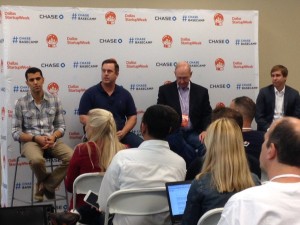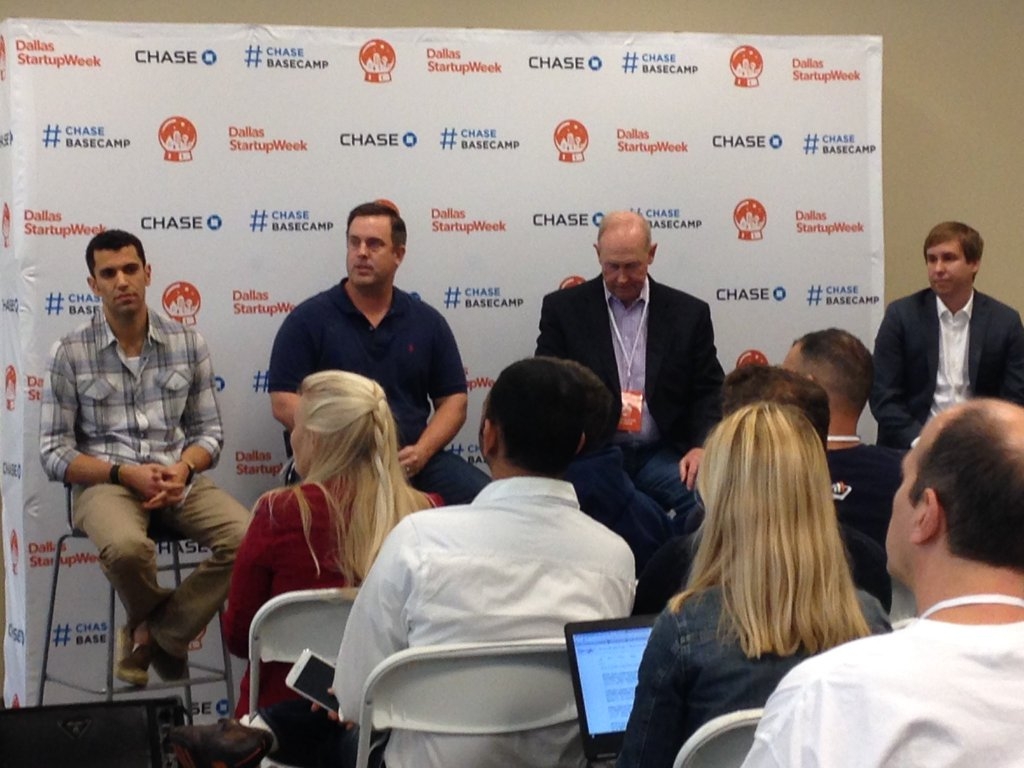
Entrepreneurs from Dallas-Fort Worth and beyond have swarmed downtown Dallas and the surrounding area for the past two days to gain valuable expertise and insight on growing their companies. But it became clear on Wednesday, there was one thing everyone wanted to know: “How do we get funded in Dallas?”
“Dallas was sort … starved of Series A funding,” said Lee McNutt, co-founder of Silicon Valley Growth Syndicate, adding that investment groups developed in the past several years have helped bolster the community. “It really is a great ecosystem.”
McNutt joined Kevin Vela, founding partner at the law firm Vela Wood and co-founder of the DAN Fund; Stephen Hays, managing partner at Deep Space Ventures; and Jason Story, partner at Hangar Ventures, for a jam-packed session donning a title that was music to local entrepreneurs’ ears: “Yes, you can raise money in Dallas.”
The funding interest continued as many of the same attendees filed from the panel straight into Ryan Roberts’ session on understanding deal terms.
In the past year, two new investment groups have developed within the Dallas startup community, collectively adding more than $20 million worth of Series A funding to the region. Deep Space Ventures made its debut on March 16, announcing a $1 million investment in Vinli and a $750,000 investment in Panamplify, both Dallas startups. Hangar Ventures launched last year and made its first investment in Dallas real estate startup Rechat.
Meanwhile, family offices nationwide are starting to cater to the generation of millennials, many of which are becoming leaders at the firms. This means more investment dollars could be allocated to technology in ways it never was before, Story said.
All of this collective activity is dialing up the heat within the Dallas investment community.
“There are more entrepreneurs than ever creating great companies that will end up in exits,” said Story, a former Austin entrepreneur who moved to Dallas after his exit. “What we saw was there was a capital imbalance – there was not enough to sustain that community.”
For Story, landing capital boils down to some simple principles: Build a strong management team, develop a great pitch deck, know the audience and make sure the company is serving a growing market. Startups should also raise their first $50,000 to $100,000 through family and friends, before approaching angels and institutions, the panelists said. With all of that, startups are likely to capture the interest of someone like Story, who takes an active role in execution with companies in which he invests.
Hays, however, was more interested in making personal connections when it comes down to who he meets. He’ll even chat with companies that have zero revenue. Whatever the business case, he’d much rather have a reference or personal introduction than meet a founder based off a cold call or email.
And in Dallas startups have an advantage when it comes to connections, Hays said.
“You’re one or two degrees [separated from] all of us who are investing,” he said, pointing out that a good network can go a long way. “Use that.”
Networking can be as easy as asking your lawyer, accountant or banker for introductions, Vela said. And if they can’t help you—chances are you have the wrong one.
But once startups have the introduction, and perhaps many, startups will face a key challenge: understanding when a deal is good and when it’s best to walk away.
Roberts explained some of the critical deal terms startups should consider in his session, “Dallas Deal Terms.” He also outlined some of the most common mistakes.
“In Dallas, some startups treat their board seats like they’re startup swag,” Roberts said.
When entering a deal, Roberts said, startups should be aware of a couple of things.
First, rules are just suggested guidelines, and not all terms are non-negotiable. So, startups should work with investors to determine the terms that work best. After all, it’s important to support the investment groups that are growing within in the community so that the ecosystem can continue building momentum.
Also, never give up a board control before a Series B round of funding. Often times, startups give up too much up front and have external individuals that alter the direction of the company without fully understanding what’s happening on the inside.
Finally, when an investor says “no,” know that it’s not the end of the story.
“No doesn’t mean no forever,” Roberts said, adding that often times investors follow companies they consider promising. “The main thing is persistence.”
But with Fortune 500 companies looking for innovative solutions, new sources of funding popping up in the startup community and other investors readying to start bigger funds when the community matures enough, as Vela suggested was in the works, Dallas’ startup community is slowly working its way out of infancy.
“We need a lot of big exits,” Jason said about what Dallas’ entrepreneurial ecosystem. “That’s what we’re looking for next.”






